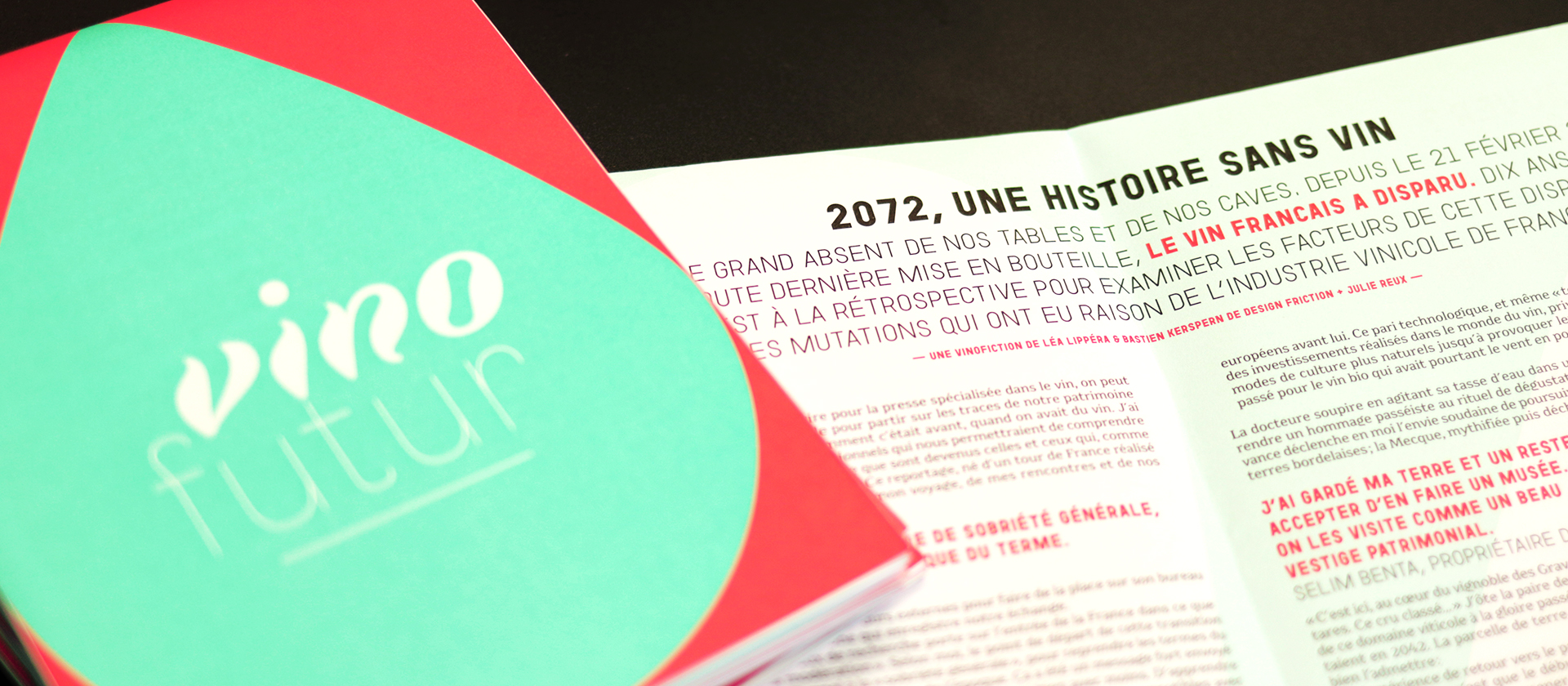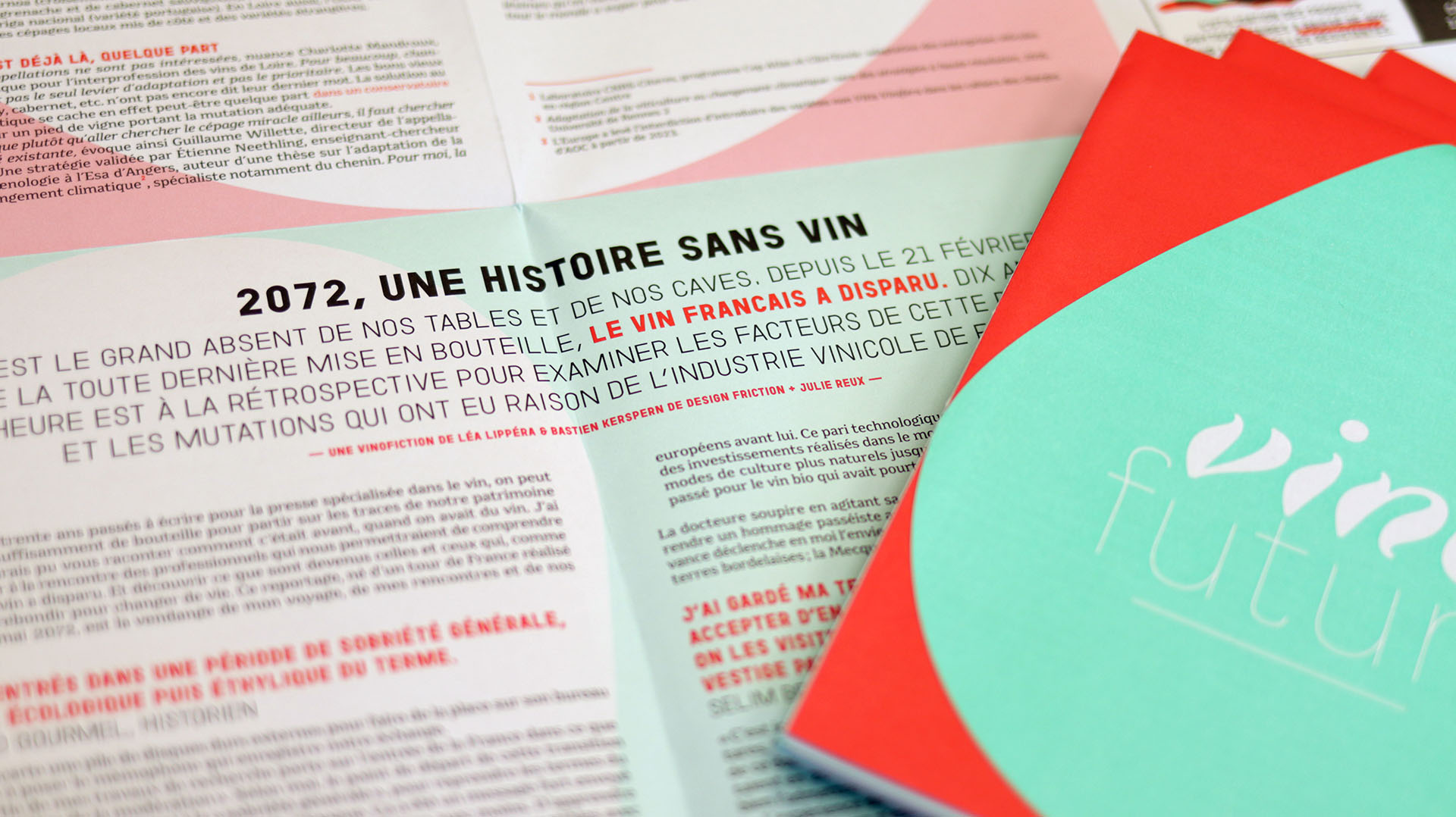
France without wine
A not-that-whining story about the end of wine
The wine is, above all, a matter of long-term vision, unfolding at the pace of decades to come. With this premise in mind, it’s no surprise that a media outlet like Vinofutur is interested in the future of wine – a context not only confronted with climate crises but also evolving consumption patterns.
We were delighted to contribute to the second edition of the fanzine by co-writing, alongside journalist Julie Reux, an expert in viticulture and founder of Vinofutur, a piece of speculative fiction exploring the gradual disappearance of French vineyards and their transformation.
Entitled 2072: A Story Without Wine (“2072, Une histoire sans vin”), this report-fiction offers a retrospective of what has become of the former French wine regions by 2072, ten years after the very last bottling of a fine vintage. We follow the introspeculative journey of a journalist, once a wine press specialist, as she travels across France to uncover the ins and outs of the transformations in the wine industry and craft, through the testimonies of those who have lived through them.
This picture, “dark grey in colour but without sulphites”, paints a portrait of a future in which the wine world as we know it today hasn’t “survived”, yet has managed to reinvent and rebound against all odds. This is the essence of Vinofutur: to spark a wake-up call among all the players in the sector – from producers to consumers, and including wine merchants – to try and dodge the inevitable!

Louise Krief, doctor in applied climatology
— The climate emergency is unfortunately not a new phenomenon, and in the past, the wine industry resisted at all costs. Have things deteriorated to the point of dealing it a fatal blow?
Dr. Krief takes a moment to think about my question, sipping her cup of pure water, comfortably nestled in a hemp beanbag. My gaze drifts over the granite walls of her traditional Breton home, which seem determined to defy both time and the whims of the weather.
— The rise in temperatures and climatic disasters have, of course, played a role in endangering the wine sector. It’s worth recalling that by 2050, 70% of France’s vineyards had already been lost due to the new climate realities. But I would say the real problem was the chosen solution to respond to it. We rolled out an entire arsenal of geo-engineering technologies to try and control microclimates. Aerial sunshades, cloud-seeding cannons to make it rain, local injection of sulphur particles into the atmosphere. And that’s not even mentioning the ideas that never came to fruition but blurred the fine line between science fiction and the absurd.
Excerpt from
“2072, A Story Without Wine”


Mia Silvacane, expatriate winemaker
— Mia, can you hear me? I fiddle with my computer microphone, which emits an unpleasant screech. Low-tech is the future, but it’s also, at times, a bit of torture.
— Yes, I can hear you perfectly. Vorkuta is no longer that backwater, and it has excellent connectivity since the oligarchs moved in!
I found Mia Silvacane’s contact while researching those who had decided not to abandon winemaking. They had to leave France and settle in lands of new wine powers that emerged “thanks” to climate change, notably Denmark and Russia.
— What made you decide to emigrate to this land of vodka drinkers?
— You know, Russian customs and tastes have gradually opened up to wine consumption beyond just the elites. But the domestic market is still small compared to the volume of exports to countries like Spain, where climate change has made viticulture impossible. Conversely, the new climate reality has encouraged Russia to develop its wine industry, mainly for economic reasons. But I have to say, I wouldn’t have thought of moving so far from my native Burgundy if they hadn’t come looking for me!
Excerpt from
“2072, A Story Without Wine”


Benjamin Coste, euphoria merchant
— Try this one. I’ve adjusted the dose to match your body size.
The man from Nantes hands me a stainless steel straw connected to a tubular container similar to those found in bulk liquid shops.
— Don’t worry, it’s got a salivophobic and antibacterial coating on the straw, of course.
I sip the silky liquid. A few moments later, I’m enveloped by a feeling of joyful intoxication, like the one people used to feel after their first glass of rosé on a summer evening.
— A good vintage, isn’t it? I say “vintage” as a figure of speech, of course. It’s still a lab-synthesised product, naturally.
I feel perfectly fine. His verbal tic slips over me without bothering me in the slightest. He continues, and I listen to him with complacency and bliss.
— Naturally, what people really appreciate is the convivial method of consuming cumvivol. You place the tube in the middle of the group of friends, and everyone passes the straw around like a hookah. It’s both exhilarating and fun.
— Naturally, I agree, sincerely.
— There’s no addiction, no health impact on consumers or the planet. It’s even an eco-magical potion in the sense that cumvivol plays the role of a psychological lubricant in our radical energy transition: it helps you take a step back from your situation with detachment. To accept being content with the bare minimum, to consume less, to forget your worries when necessary, and to come together to face adversity.
And indeed, I feel ready to face any kind of adversity.
Excerpt from
“2072, A Story Without Wine”


